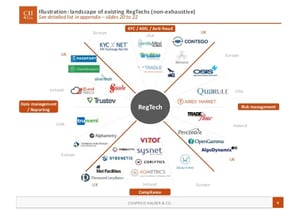The term 'RegTech' was coined in 2015 by the Financial Conduct Authority, which described it as “a sub-set of FinTech that focuses on technologies that may facilitate the delivery of regulatory requirements more efficiently and effectively than existing capabilities".
Indeed this sector has really taken off over the past 2-3 years with investment into RegTech surpassing $1BN in 2017. This is not surprising when considering the rise in prominence for the compliance and risk management roles within financial service firms post the financial crisis of 2008. Since then new regulations were put in place to improve risk controls, maintain capital and create a more transparent financial sector.
With an increased focus on managing risk and complying with stricter rules, the financial industry needed to find new ways to adapt. On top of this, technology was advancing; meaning much more was possible.
RegTech companies were born out of this combination of regulatory change and more efficient technology. From a Regulatory point of view The FCA have led the way with Project Innovate and a FinTech Sandbox and Nick Cook’s RegTech team blazing a trail using their ‘TechSprint’ initiatives to bring market participants together to brain storm and produce tech based solutions to key challenges such as; streamlining regulatory reporting, financial services and mental health and AML and financial crime.
Indeed we wrote last week about The FCA Digitised Regulatory Reporting project, which will bring a machine-readable handbook and allow firms to interpret rules, apply them to the business and report back to the regulatory in real-time.
Now there is a wide range of companies offering these kinds of services. Some offer solutions for banks, wealth managers and IFAs to help them comply, while others are aimed at helping policymakers monitor those they are regulating.
The key to understanding what a good RegTech platform can do is ensuring it provides key savings in time and costs and streamlines compliance activities along with having the ability to scrutinise your business and client data to ensure your firm is meeting the regulations in a universal manner.
In other words RegTech provides the ability for firms to scrutinise compliance activity in a holistic way moving away from a checklist or tick box and a reactionary mentality. This is important as the rules are complex and affect many parts of the business, yet they are commonly tackled with a silo mentality.
RegTech comes in many forms across key activities such as Tax management, Regulatory Reporting, Portfolio Management, AML/KYC/PEP checks, Anti-fraud, Operations risk  management, Trade Monitoring to name a few.
management, Trade Monitoring to name a few.
With the introduction of Artificial Intelligence into the FinTech mix, we are also seeing RegTech benefit with Compliance chat bots able to scrutinise the FCA handbook and client data, BioMetrics able to measure traders blood pressure to optimise compliant performance and algorithms able to flag potential AML/KYC breaches to name a few.
One of the key benefits RegTech can bring is a diagnostic assessment for the conduct and culture across key risk drivers such as individual biases, poor communications, little accountability, inadequate financial security, conflicts of interest and much more. This enables firms to make the intangible tangible in providing a digital thumbprint and quality management Information (MI) for firms to assess professional practice across key competencies, accountabilities and propositions.
So if you’re thinking of employing RegTech within your business then you will need to ensure you do your research and due diligence across 3 key areas:
- Strategy required: Research and assess your compliance and regulatory strategy for human and technology intervention against the ever-changing regulatory landscape and ensure a holistic approach is taken across the impact of regulations across the business
- Benefits: Assess time, cost savings, de-risking and management information opportunities
- Integration: RegTech needs to be coherent and integrate seamlessly with the operational business model and practice management technology you employ, so it means ensuring APIs are available, integration is carefully project managed and KPIs are exceeded!
Please click the below icon link to MO®'s #RegTech platform and learn more about MO® today..

